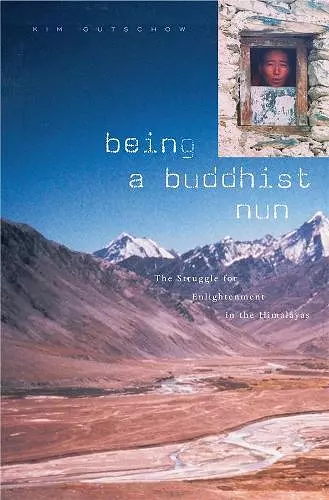Being a Buddhist Nun
The Struggle for Enlightenment in the Himalayas
Format:Hardback
Publisher:Harvard University Press
Published:14th Aug '04
Currently unavailable, and unfortunately no date known when it will be back

They may shave their heads, don simple robes, and renounce materialism and worldly desires. But the women seeking enlightenment in a Buddhist nunnery high in the folds of Himalayan Kashmir invariably find themselves subject to the tyrannies of subsistence, subordination, and sexuality. Ultimately, Buddhist monasticism reflects the very world it is supposed to renounce. Butter and barley prove to be as critical to monastic life as merit and meditation. Kim Gutschow lived for more than three years among these women, collecting their stories, observing their ways, studying their lives. Her book offers the first ethnography of Tibetan Buddhist society from the perspective of its nuns.
Gutschow depicts a gender hierarchy where nuns serve and monks direct, where monks bless the fields and kitchens while nuns toil in them. Monasteries may retain historical endowments and significant political and social power, yet global flows of capitalism, tourism, and feminism have begun to erode the balance of power between monks and nuns. Despite the obstacles of being considered impure and inferior, nuns engage in everyday forms of resistance to pursue their ascetic and personal goals.
A richly textured picture of the little known culture of a Buddhist nunnery, the book offers moving narratives of nuns struggling with the Buddhist discipline of detachment. Its analysis of the way in which gender and sexuality construct ritual and social power provides valuable insight into the relationship between women and religion in South Asia today.
Solidly based on over a decade of fieldwork, Gutschow successfully dispels a number of stereotypical misconceptions about Buddhist monasticism in general and Buddhist nuns more specifically. She places monasticism in its necessary political and economic spheres, while not ignoring the pragmatic aspects of lived Buddhism. Being a Buddhist Nun transports women and nuns from their marginal peripheral position in Buddhist history to its ideological center. -- Frank J. Korom, Boston University
A brilliant analysis, beautifully written, of Buddhism as never before portrayed. Privileging popular practices and local informants over textual expertise, Gutschow takes us right into the heart of the contradictions between Buddhist doctrine and practice, showing the mechanisms that reinstate the very social hierarchies and injustices that the Buddha disdained. The book is a tour de force, a bold and courageous analysis that will change the field of Buddhist studies forever. A truly enlightening and extraordinary book. -- Unni Wikan, University of Oslo
Being a Buddhist Nun is a persuasive and moving combination of vivid writing and sophisticated scholarship. The lived experience is wonderfully captured in both verbal and visual thick descriptions of foods, tasks, conversations, all the evocative phenomena of the everyday, while the book raises questions that are significant far beyond the Himalayas, ranging from the usual questions of gender--Why Cannot Nuns Be Monks?--for which Kim Gutschow offers new answers, to the not-so-usual questions of celibacy, in which she sees newly relevant values. -- Wendy Doniger, Mircea Eliade Professor of the History of Religions, University of Chicago
In many religions, such as Christianity, Judaism, and Hinduism, women are considered spiritually inferior to men and often suffer inequitable treatment in the wider society. Buddhism, with its highly egalitarian doctrine, is often perceived as being different. Gutschow shows that in this regard we have mistakenly focused on ideals rather than on actual practices. -- James F. DeRoche * Library Journal *
The inescapable struggle of being a woman in a patriarchal system is the heart of Gutschow's work and permeates her further discussions, including ideologies of purity and pollution and Tantric approaches to the question of female enlightenment...Gutschow's analysis is penetrating, and her supporting anecdotes are often vivid and effective. Her work reveals that the reality of Himalayan Buddhist monasticism, far from being Shangri-La, is thoroughly rooted in the very foibles of the world it professes to renounce. * Publishers Weekly *
Based on [Gutschow's] observations and research in Zangskar, the book describes a rigid hierarchy in which monks rule, enjoying power and prestige and conducting important ceremonies and rituals, such as blessing households and construction sites in their villages. Nuns, who must defer to monks and sit behind them at formal gatherings, are relegated to menial tasks, such as collecting the dung and sticks that the entire community will burn for fuel during the region's harsh winters. -- Anne Stuart * Harvard Magazine *
Being a Buddhist Nun is a valuable account of the life of nuns in the Himalayan valley of Zanskar, a region of Ladakh in north-west India. The work is driven by a deep sense of injustice and a compelling focus on a remote society still medieval in character...[Gutschow] present[s] an unrivalled account of monastic economy and social anthropology in Ladakh. Her text is full of 'thick' description, delightful anecdotes, biographies of courageous and not so courageous nuns, as well as accounts of the personal joys and sufferings of individuals. Although she focuses on the often lamentable ways in which nuns suffer discrimination, she is not unduly disrespectful of the monastic system to which they belong; rather she subjects it to a prolonged and penetrating examination and interpretation. -- John Crook * Times Literary Supplement *
- Joint winner of Sharon Stephens Prize 2005
- Nominated for Award for Excellence in the Study of Religion 2004
- Nominated for Victor Turner Prize in Ethnographic Writing 2006
- Nominated for Joan Kelly Memorial Prize in Women's History 2005
- Nominated for Harry J. Benda Prize 2006
ISBN: 9780674012875
Dimensions: 235mm x 156mm x 32mm
Weight: 667g
376 pages